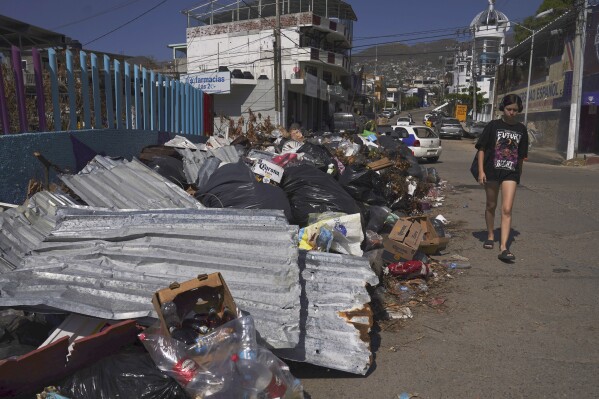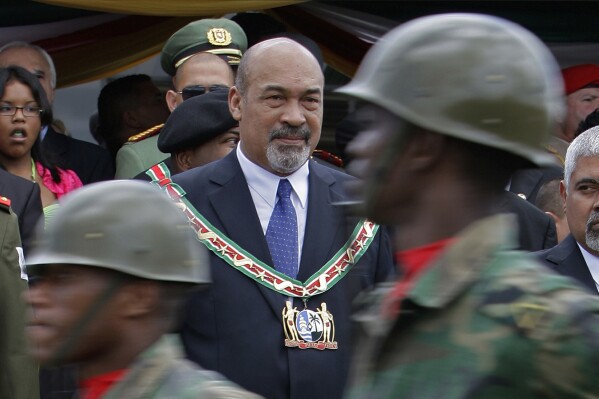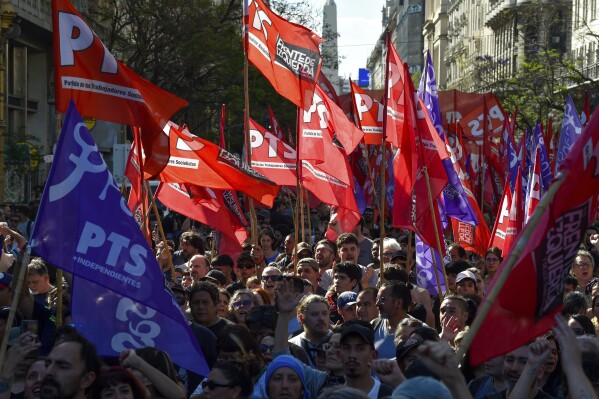Meet the Russian professor who became mayor of a Colombian city
TUNJA, Colombia (AP) — Mikhail Krasnov walks along the steep streets of the Colombian city of Tunja just like any other resident — except he’s no longer just another neighbor.
Now people greet the newly elected mayor as he makes his way around town and stop him for pictures. One woman hugs the man known here as the “Russian professor” and poses for a selfie.
Krasnov, a 45-year-old university professor from Russia, was one of the unexpected winners in Colombia ’s regional elections in October. He prevailed by promising to stamp out corruption and embrace more meritocracy in the city government, where jobs often go to those with political connections.
He’s also trying to reduce the city’s debt.



“We are not here to promote my face,” said Krasnov, who has been interviewed by dozens of national media outlets and also a Russian network, since he won the election. “We want to send the message that Tunja exists, that we are competitive and want to attract investors.”
The blond and green-eyed professor stands out in Tunja, a city of 170,000 people in Colombia’s Andean highlands, where many residents are of Indigenous descent.
He is believed to be the only Russian living in the city, where he has been teaching economics and human rights courses at the local public university for the past decade.
Krasnov was born in Saratov, a city in southern Russia, in 1978. He arrived in Tunja in 2008 on a student exchange program, fell in love with the city’s food and culture, learnt Spanish and became a Colombian citizen two years ago.
“My mother has Ukrainian roots, my father is Russian and I am Colombian” he says proudly, adding that he opposes Russia’s invasion of Ukraine, where he has friends and family.
The professor says he decided to get involved in politics last year, due to his growing frustration with the city’s lack of progress in areas like job creation and poverty reduction.
“You reach an age where you start to ask yourself what you can contribute” to society, he said of his decision to enter the turbulent world of Colombian politics.
At first Krasnov tried to run as an independent, which meant he had to collect 30,000 signatures to get himself on the ballot.
After collecting the signatures however, Krasnov discovered there was another requirement for registering as a candidate – a $10,000 fee.
That was too much for Krasnov’s modest budget, but his growing fame and commitment to campaigning got him noticed by some political parties, who have the right to register candidates.
Eventually Krasnov was put on the ballot by The Force for Peace, a party founded last year by the former president of Colombia’s congress.
Krasnov describes himself as a centrist, and jokes about the campaign, in which he ran against several candidates that were better funded and represented traditional parties that have run the city for years.
In the nine-candidate race Krasnov also defeated a politician from President Gustavo Petro’s leftist party, the Historical Pact.
“I’m a public university professor, who was born in the Soviet Union, so you’d think I’d be on the left” he said. “But the leftists were the first ones to attack me, even when I was collecting signatures, because I also appealed to their voters.”
Krasnov won the election with 31% of the overall vote.
“It was a big surprise,” said Alejandra Monroy Martínez, a political scientist based in Tunja, who remembers seeing Krasnov handing out flyers and talking to people on the city’s streets. She said his victory reflects a growing dissatisfaction with the city’s political class.
Alba Rodríguez Parra, 56, said she trusts “the Russian” because he was a professor at the city’s public university, speaks six languages and has several degrees.
She’s hoping that the new mayor can reduce growing crime rates and help to expand the streets that lead into the city center and are sometimes jammed with cars.
“Previous mayors have let us down, because they pocketed all the money” she said.
____
Follow AP’s coverage of Latin America and the Caribbean at https://apnews.com/hub/latin-america
Disclaimer: The copyright of this article belongs to the original author. Reposting this article is solely for the purpose of information dissemination and does not constitute any investment advice. If there is any infringement, please contact us immediately. We will make corrections or deletions as necessary. Thank you.




